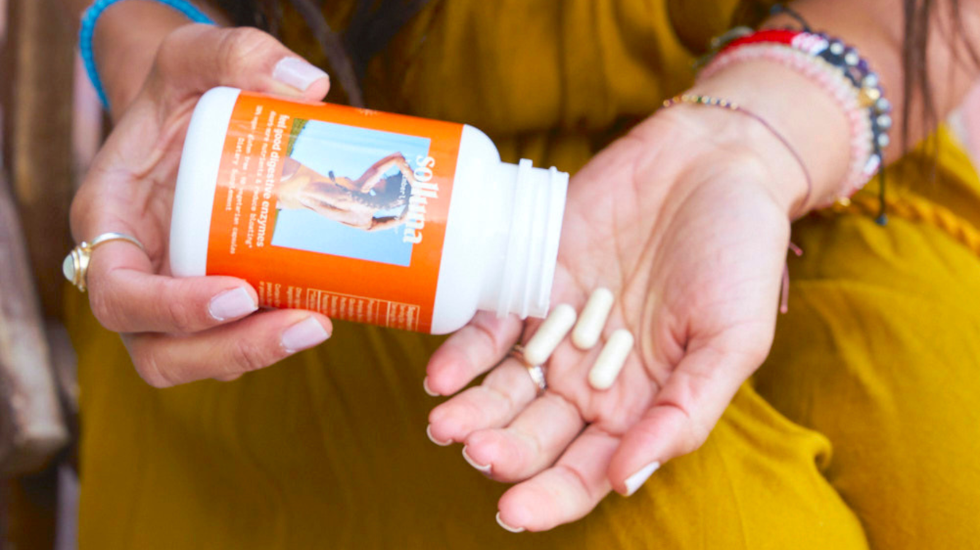Bloating can be more than just an occasional inconvenience; it’s a recurring discomfort that begs for a sustainable solution. In this article, we dive deep into the question: do digestive enzymes help with bloating? Prepare to uncover the secrets behind these powerhouse enzymes and discover how they may hold the key to a more comfortable and enjoyable digestive experience. Say goodbye to the bloat and take a step towards improved gut health with us. Let’s start unraveling the mysteries of digestive enzymes and their potential to conquer bloating once and for all.
First things first, it’s crucial to understand the underlying reasons behind bloating. Once you clearly understand why you’re experiencing this discomfort, you can begin exploring how digestive enzymes restore balance to your digestive system.
Bloating is Listening to Your Body’s Call for Care and Attention

Bloating is a familiar discomfort that many of us, including myself, have experienced at some point. It’s that sensation of having an uncomfortably full or swollen abdomen, often coupled with gas and sometimes abdominal pain.
When you’re bloating, it feels like your stomach is in a state of unrest, swollen and uncomfortably full, as if you’re carrying an unnecessary burden within. It’s not merely about the physical expansion of your abdomen; it’s the sensation of tightness, heaviness, and sometimes even pain, which can leave you feeling weighed down physically and emotionally.
This discomfort can ripple out, affecting your mood, energy levels, and even your sense of self. When you’re bloated, your body feels less like the harmonious, balanced sanctuary it should be and more like an obstacle to your well-being. It can be a reminder of how closely linked our physical health is with our emotional and spiritual state.
Why Do We Get Bloated?
Bloating can often be a sign that your digestive tract is out of balance, potentially indicating issues like insufficient stomach acid, which is essential for proper digestion and nutrient absorption.
Reflecting on my own experiences, I’ve noticed how my dietary choices significantly influence bloating. Foods that are rich in salt, high in fat, or difficult for the body to digest, like beans, lentils, carbonated drinks, and dairy, used to wreck my digestion!
But it’s not only about what you eat. How you eat is equally important. Rushing through meals, not chewing thoroughly, or eating under stress are habits I’ve had to change to manage bloating consciously.
Your lifestyle choices play a crucial role, too. A lack of movement, not drinking enough water, and eating irregularly can upset your digestive system, leading to bloating. And hormonal fluctuations can significantly impact your digestion if you’re like many women in the 25-45 age group. You may notice more bloating during different phases of your menstrual cycle, a common scenario due to hormonal changes affecting your gastrointestinal tract.
Your Digestive Enzymes At Work
Let’s talk about digestive enzymes, a key player in your digestive health. These enzymes are essentially biological catalysts that speed up the breakdown of food in your digestive system. Each type of enzyme has a specific role – some break down proteins, others specialize in carbohydrates or fats. Their main job is to break these complex molecules into smaller, more absorbable ones, making the digestion process smoother and more efficient.
It’s crucial to understand that simply having digestive enzymes isn’t enough; their efficiency is key to your digestive health. Factors like stress, a poor diet, and even natural aging can significantly impact how well these enzymes function and lead to one digestive issue after another. This is where your proactive role becomes essential.
Stress: Stress is a major factor that can hinder the efficiency of your digestive enzymes. When you’re stressed, your body’s focus shifts away from digestion as part of the ‘fight or flight’ response. This can lead to reduced enzyme production and activity, digestive discomfort, and increased bloating. To counter this, incorporating stress-reduction techniques into your daily routine can be a game changer. Practices like yoga, meditation, and even simple breathing exercises can help calm your mind and, in turn, support your digestive system.
Diet: Your diet is also pivotal in gut health and enzyme efficiency. A diet lacking in natural enzyme sources can leave your body struggling to digest food effectively. Consider incorporating more raw fruits and vegetables into your meals to support your digestive enzymes. Foods like pineapple, papaya, mango, and avocados are rich in natural digestive enzymes. Additionally, fermented foods such as yogurt, kefir, and sauerkraut not only provide digestive enzymes but also probiotics, which further aid in digestion.
Aging: Aging is another factor that can affect your digestive enzymes. As you age, your body naturally produces fewer enzymes. While this is a normal part of aging, you can still support your digestive health by focusing on enzyme-rich foods and considering digestive enzyme supplements. A digestive enzyme supplement can be particularly beneficial if you find it challenging to get enough natural enzymes from your diet alone.
Do I Need A Digestive Enzyme Supplement?
Digestive enzyme supplements are designed to aid your body’s natural digestive process and supplement an enzyme deficiency. They come packed with specific enzymes that target various types of food, helping to break them down more effectively. These supplements can be a game-changer for you, especially if your diet lacks certain nutrients or if you’re dealing with conditions that affect digestive health, like Irritable Bowel Syndrome (IBS) or lactose intolerance.
Irritable bowel syndrome often brings with it a range of symptoms like bloating, abdominal discomfort, and irregular bowel movements, which can be linked to difficulties in food digestion. Digestive enzyme supplements promote healthy digestion by reducing the intensity and frequency of IBS digestive symptoms, offering a sense of relief and contributing to a more balanced and comfortable digestive experience.
Enzyme supplementation can be a vital aid as you age! Since your body’s natural enzyme production tends to decrease over time, supplementing can help fill in the gaps, ensuring that your digestive system continues to function optimally. This can lead to improved nutrient absorption, more comfortable digestion, and less bloating!
How Do Digestive Enzymes Help With Bloating?
Certain foods may not be fully digested when your body lacks adequate enzymes. This partially digested food can ferment in the gut, producing excess gas, which in turn causes bloating.
Digestive enzymes help with bloating by ensuring a more complete and efficient breakdown of food. For instance, enzymes like amylase, lipase, and protease target carbohydrates, fats, and proteins. By effectively breaking down these macronutrients, they help prevent the fermentation process that can lead to gas buildup and bloating.
The right digestive enzyme supplement can even make it easier for you to digest food you usually can’t! Some foods that are notorious for digestive discomfort, such as beans and cruciferous vegetables like broccoli and cabbage, contain complex sugars that are difficult for some people to digest. Specific enzymes, like alpha-galactosidase, can help break down these sugars, making these nutritious foods more digestible and less likely to cause bloating.
Digestive enzymes also contribute to a healthier gut environment! A well-functioning digestive system is less prone to imbalances that can cause bloating, such as dysbiosis (an imbalance in gut bacteria) or slow transit time. By facilitating smoother digestion, enzymes help maintain a balanced gut flora and regular bowel movements, both of which are essential for reducing bloating and maintaining overall gut health.
What Type of Digestive Enzymes Help With Bloating?
Not all digestive enzyme supplements are created equal! When it comes to choosing digestive enzymes for bloating relief, it’s important to know which types are most effective for you!
Protease for Protein Digestion: Protease is vital for breaking down proteins into smaller peptides and amino acids. If you often feel bloated after eating protein-rich meals, a supplement containing protease can help ensure these proteins are digested more thoroughly, reducing the chances of bloating.
Amylase for Carbohydrates: Amylase targets carbohydrates, breaking them down into simpler sugars. Meals high in carbs, especially complex ones like whole grains, can sometimes lead to bloating. Including amylase in your enzyme regimen can aid in smoother carb digestion.
Lipase for Fats: Fats can be heavy on the stomach and hard to digest for some. Lipase plays a crucial role in breaking down dietary fats into fatty acids and glycerol, easing the digestive burden and potentially reducing bloating associated with high-fat meals.
Alpha-Galactosidase for Complex Carbs: This enzyme is particularly beneficial for digesting complex sugars found in beans, legumes, and cruciferous vegetables – common bloating culprits. By breaking down these sugars, alpha-galactosidase can significantly reduce gas and bloating.
Cellulase for Fiber Digestion: Cellulase helps break down cellulose, a type of fiber found in fruits and vegetables. Since fiber can cause bloating in some individuals, cellulase can help make these otherwise healthy foods more digestible.
Bloating Relief with Solluna’s Feel Good Digestive Enzymes
Solluna’s Feel Good Digestive Enzymes are crafted with these key enzymes, ensuring a comprehensive approach to tackling various dietary causes of bloating.
Such a diverse range ensures that no matter what your meal consists of, these enzymes support your digestive system in efficiently breaking down various food components.
But the essence of Solluna’s approach goes beyond mere symptom relief. It’s about aligning with your body’s natural rhythm, supporting the digestive process in a way that resonates with your body’s innate wisdom.
These enzymes aren’t just tools for digestion; they’re a means of nurturing your body’s capabilities, enhancing nutrient absorption, and promoting gut health, which in turn influences your overall energy and vitality.
In embracing the holistic path Solluna offers, understanding that digestive enzymes can be a powerful ally in combating bloating not only brings relief but also aligns you with a deeper, more harmonious connection to your body’s natural rhythms and overall well-being!







0 Comments